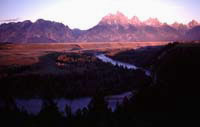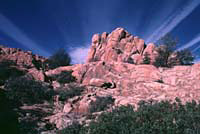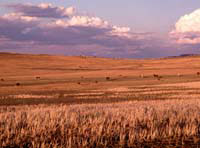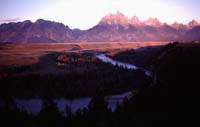Historians looking back on the turn of the millennium may well call it the golden age of conservation. In recent years, we have witnessed bold national efforts to protect the last wild places of the U.S.

Western politicians could move mountains.
Many of these lands are in the West, a place that itself is going through a tremendous transition from an extractive culture and economy — based on mining, logging, and grazing — to one of conservation. So it would seem natural that Western politicians would be leading the charge to protect the resources upon which the new paradigm is based.
But they are not. Instead, they have bunkered down in opposition to these new efforts in an attempt to prevent the inevitable. If they would just lift their heads, Western members of Congress would see that they are squandering a historic opportunity to lead.
Time and again, the West’s representatives in both the House and Senate have been on the wrong side of critical environmental issues: reform of the 1872 Mining Act, restoration of the Columbia River’s salmon, reintroduction of wolves to Yellowstone, reform of public lands grazing, reform of policies that allow drilling and cutting and blasting in the public’s last wild places — on and on it goes.

Rock, rock — who’s there?
Only a few weeks ago, a handful of representatives from Western states attempted to stop President Clinton from protecting certain important lands as national monuments. They were rebuffed by their colleagues in the House by a vote of 234 to 197, with 38 Republicans joining 196 Democrats in voting to protect a prerogative which has been used by almost every president since Theodore Roosevelt. More recently a U.S. senator from here in the Rockies counted the votes, ran up the white flag, and withdrew a proposal that would have scuttled the current efforts to protect the public’s biologically important roadless areas.
The innovative and bipartisan Conservation and Reinvestment Act (CARA) overwhelmingly passed the House in May by a three-to-one margin. Yet the most vocal and bizarre opposition came from members of the House from Rocky Mountain states. Now this worthwhile bill, which would assure the public’s right to increase our common land holdings, is being held up in the Senate because of the resistance of a very few senators from the same region.
It wasn’t always this way. Though the West has always lacked numerical clout in Congress — all seven states of the Rocky Mountain West are represented by only 36 members, far less than California’s 54 members — it made up for that with leadership. From Arizona’s Republican Barry Goldwater to Idaho’s Democrat Frank Church, the West led and the nation noticed and followed. Burton Wheeler (D-Mont.), Gale McGee (D-Wyo.), Alan Bible (D-Nev.), Pat McCarran (D-Nev.), Alan Simpson (R-Wyo.), Mo Udall (D-Ariz.), Mike Mansfield (D-Mont.) — and the list doesn’t stop there — all led on the critical issue of their day, bringing recognition and pride to the people of the Rockies. This region was understood to be a national enclave of progressive thought and reform.

Range rovers.
Now, as the movement to conserve our land, air, and water resources hits critical mass, we need that regional leadership again.
Our elected national officials should commit to national and local efforts to create new jobs in the forests and mountains, repairing the insults of the old. They can begin by passing CARA. They should then pass a national mine reclamation act.
Congress, led by Western delegations, should enact both appropriations and tax relief to put our loggers, miners, drillers, and young people to work in the profitable and high-salaried tasks of environmental repair, renewal, and conversion. And, of course, they should encourage continued harvest wherever it is sustainable.
The West is a special place. It is the nation’s needed frontier, the brow of its last hill. It has always been the place of myth and story and the promises of tomorrow.
If the West’s congressional delegations ignore that promise, they may well repeat the tragedy that has befallen the members of Congress from the South who, before and after the landmark Civil Rights Act, failed to lead and became marginalized in their national effectiveness.
The choice for the West and its elected representatives isn’t simply whether or not to lead. It is whether to lead or be left behind.


